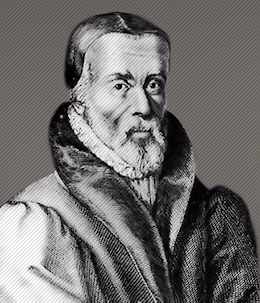Textus Receptus Bibles
William Tyndale Bible 1534
New Testament
| 2:1 | Wherfore laye asyde all maliciousnes and all gyle and dissimulacion and envie and all backbytynge: |
| 2:2 | and as newe borne babes desyre that reasonable mylke which is with out corrupcion that ye maye growe therin. |
| 2:3 | If so be that ye have tasted how plesaunt the lorde is |
| 2:4 | to whom ye come as vnto a livynge stone disalowed of men but chosen of god and precious: |
| 2:5 | and ye as lyvynge stones are made a spretuall housse and an holy presthode for to offer vp spretuall sacryfice acceptable to god by Iesus Christ. |
| 2:6 | Wherfore it is contayned in the scripture: beholde I put in Sion an heed corner stone electe and precious: and he that beleveth on him shall not be ashamed. |
| 2:7 | Vnto you therfore which beleve he is precious: but vnto them which beleve not ye stone which ye bylders refused ye same is made ye heed stone in the corner |
| 2:8 | and a stone to stomble at and a rocke to offende them which stomble at the worde and beleve not that where on they were set. |
| 2:9 | But ye are a chosyn generacion a royall presthod an holy nacio and a peculiar people that ye shuld shewe the vertues of him that called you out of darknes into hys marvelous light |
| 2:10 | which in tyme past were not a people yet are now the people of God: which were not vnder mercye but now have obteyned mercye. |
| 2:11 | Derly beloved I beseche you as straugers and pilgrems abstayne from flesshly lustes which fyght agaynst the soule |
| 2:12 | and se that ye have honest conversacion amonge the getyls that they which backbyte you as evyll doars maye se youre good workes and prayse god in the daye of visitacion. |
| 2:13 | Submit youre selves vnto all manner ordinaunce of man for the lordes sake whether it be vnto the kynge as vnto the chefe heed: |
| 2:14 | other vnto rulars as vnto them that are sent of him for the punysshment of evyll doars: but for the laude of them that do well. |
| 2:15 | For so is the will of god that ye put to sylence the ygnorancie of the folyshe men: |
| 2:16 | as fre and not as havinge ye libertie for a cloke of maliciousnes but even as the servautes of god. |
| 2:17 | Honoure all men. Love brotherly felishippe. Feare god and honour the kynge. |
| 2:18 | Servauntes obey youre masters with all feare not only yf they be good and courteous: but also though they be frowarde. |
| 2:19 | For it is thankeworthye yf a man for conscience towarde god endure grefe sufferinge wrongfully. |
| 2:20 | For what prayse is it if when ye be buffeted for youre fautes ye take it paciently? But and yf when ye do well ye suffer wronge and take it paciently then is there thanke with God. |
| 2:21 | For herevnto verely were ye called: for Christ also suffered for vs levinge vs an insample yt ye shuld folowe his steppes |
| 2:22 | which dyd no sinne nether was ther gyle founde in his mouth: |
| 2:23 | which when he was reviled reviled not agayne: whe he suffered he threatened not: but comitted the cause to him that iudgeth ryghteously |
| 2:24 | which his awne silfe bare oure synnes in his body on the tree that we shuld be delyvered from synne and shuld lyve in rightewesnes. By whose strypes ye were healed. |
| 2:25 | For ye were as shepe goinge astraye: but are now returned vnto ye shepheerd and bisshoppe of youre soules. |

William Tyndale Bible 1534
William Tyndale was the first man to ever print the New Testament in the English language. Tyndale also went on to be the first to translate much of the Old Testament from the original Hebrew into English, but he was executed in 1536 for the "crime" of printing the scriptures in English before he could personally complete the printing of an entire Bible. His friends Myles Coverdale, and John [Thomas Matthew] Rogers, managed to evade arrest and publish entire Bibles in the English language for the first time, and within one year of Tyndale's death. These Bibles were primarily the work of William Tyndale.